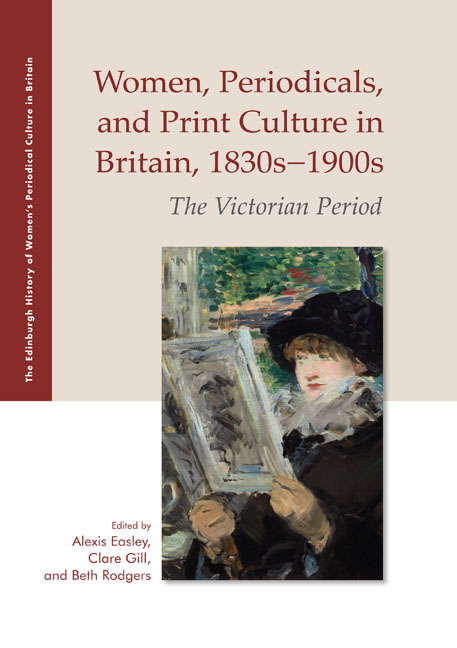Book contents
- Frontmatter
- Contents
- List of Illustrations
- Acknowledgments
- Introduction: Women, Periodicals, and Print Culture in the Victorian Period
- Part I (Re)Imagining Domestic Life
- Part II Constructing Modern Girls and Young Women
- Part III Women and Visual Culture
- Part IV Making Space for Women
- Part V Constructing Women Readers and Writers
- Part VI Intervening in Political Debates
- Intervening in Political Debates: Introduction
- 30 Brewing Storms of War, Slavery, and Imperialism: Harriet Martineau's Engagement with the Periodical Press
- 31 Mary Smith (1822–1889): A Radical Journalist under Many Guises
- 32 In Time of Disturbance: Political Dissonance and Subversion in Violet Fane's Contributions to the Lady's Realm
- 33 ‘Our Women in Journalism’: African-American Women Journalists and the Circulation of News
- 34 The Response of the Late Victorian Feminist Press to Same-Sex Desire Controversies
- 35 Wings and the Woman's Signal: Reputation and Respectability in Women's Temperance Periodicals, 1892–1899
- Notes on Contributors
- Index
- Plate section
35 - Wings and the Woman's Signal: Reputation and Respectability in Women's Temperance Periodicals, 1892–1899
from Part VI - Intervening in Political Debates
Published online by Cambridge University Press: 25 October 2019
- Frontmatter
- Contents
- List of Illustrations
- Acknowledgments
- Introduction: Women, Periodicals, and Print Culture in the Victorian Period
- Part I (Re)Imagining Domestic Life
- Part II Constructing Modern Girls and Young Women
- Part III Women and Visual Culture
- Part IV Making Space for Women
- Part V Constructing Women Readers and Writers
- Part VI Intervening in Political Debates
- Intervening in Political Debates: Introduction
- 30 Brewing Storms of War, Slavery, and Imperialism: Harriet Martineau's Engagement with the Periodical Press
- 31 Mary Smith (1822–1889): A Radical Journalist under Many Guises
- 32 In Time of Disturbance: Political Dissonance and Subversion in Violet Fane's Contributions to the Lady's Realm
- 33 ‘Our Women in Journalism’: African-American Women Journalists and the Circulation of News
- 34 The Response of the Late Victorian Feminist Press to Same-Sex Desire Controversies
- 35 Wings and the Woman's Signal: Reputation and Respectability in Women's Temperance Periodicals, 1892–1899
- Notes on Contributors
- Index
- Plate section
Summary
IN 1875, IN THE BIRTHPLACE of temperance, minutes of the Preston Temperance Society show that no women were committee members and that none spoke at meetings. In fact, the only mention of female temperance workers was to thank them ‘for presiding over the tea tables’ (Annual Report 1875: 14). Due to the initial positioning of temperance reform as a moral issue, women were permitted to take part as an extension of their essentially feminine, domestic role, responsible for the well-being and morality of their family and wider society. This work was regarded as largely domestic, but in order to undertake it, female reform workers had to leave the feminised domestic sphere and enter what Megan Smitley terms ‘the feminine public sphere’ (2009: 3). This space was not of the private, feminine domestic, nor was it a public, masculine space. Rather, it was a complex space of female-led philanthropy and charity, in which women could undertake reform work and yet retain their reputation and respectability.
To explore the inherent complexity of the relationship between respectability and reform work, this chapter will explore and compare the journals of the two largest femaleonly temperance organisations in the United Kingdom. As I will demonstrate, Wings and the Woman's Signal, as mouthpieces of their respective organisations, the Women's Total Abstinence Union (WTAU) and the National British Women's Temperance Association (NBWTA), function as spaces where debates around the role, place, and respectability of women can be read.
The Schism: Wings and the Woman's Signal
Most women were not granted full membership of temperance organisations and had to undertake their work as part of specific ladies’ committees (Shiman 1986: 194). Meaningful reform work in this male-dominated field was often difficult and thus the British Women's Temperance Society (BWTA) was formed in 1876 as the first national, female-only banner for the undertaking of temperance work. Their journal, the British Women's Temperance Journal (1883–92), was ‘launched in co-operation with the male proprietors and editors of The Crusade,’ a periodical initially connected with the Good Templar order, yet, in a supposedly female-only space, male editorial control remained (Niessen 1994: 272).
- Type
- Chapter
- Information
- Women, Periodicals and Print Culture in Britain, 1830s–1900sThe Victorian Period, pp. 555 - 567Publisher: Edinburgh University PressPrint publication year: 2019

